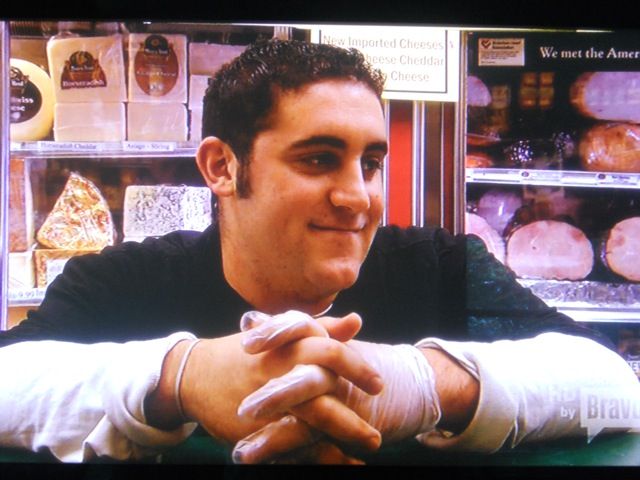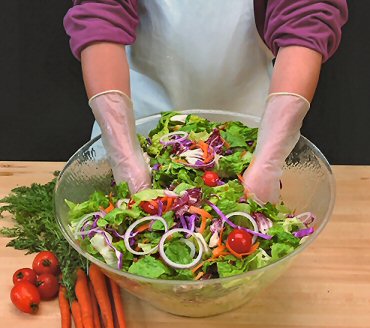Taking smugness to a new level, which is a worthy achievement given the level of smugness already found in Oregon, restaurant owners and chefs have successfully delayed a new no-hands rule for food contact.
Michael Russell of OregonLive writes the rule could make dining out more expensive, create waste and, despite its good intentions, do little to protect public health and isn’t safer than the state’s current rigorous handwashing practices.
Except no one has validated whether those handwashing practices are actually followed or just  sound smugly superior.
sound smugly superior.
"The idea that using rubber gloves is going to stop people from getting sick is ludicrous," said Andy Ricker, chef and owner of Pok Pok restaurants in Portland and New York. His New York locations already comply with that state’s no bare-hand-contact rule.
"For it to be safe, every time you touch something, you’d have to take your gloves off, wash your hands, and put on new gloves." Ricker said.
At least a half-dozen recent studies have concluded the same: Counter intuitively, wearing gloves does little to prevent the spread of bacteria compared with effective hand washing.
But wearing gloves is not the same as a no-bare-hand contact rule. They’re called tongs (not thongs).
Wearing gloves has been found to reduce the number of times people wash their hands, while warm, moist conditions create a hothouse for bacteria to grow. A 2005 report from the University of Oklahoma Health Sciences Center that analyzed grilled tortillas found more staph, coliform and other harmful bacteria on the samples prepared by workers wearing gloves.
Eric Pippert, a manager with the Oregon Health Authority’s Foodborne Illness Prevention department, said the measure was created to prevent the spread of norovirus, the most common cause of food poisoning. It’s often spread through improper hand washing by employees after they use the bathroom.
Norovirus spreads easily; a don’t work while sick rule would be more effective at reducing the spread of norovirus (ask Harvard or Heston).
In response to those who favor hand washing, Pippert points to a 2003 health authority survey in which restaurant inspectors found at least one hand-washing violation at nearly two-thirds of Oregon eateries.
"Anybody who tells you hand washing is so darned good, well, yeah, except when you’re not doing it," he said.
But restaurant owners argue that handwashing has since been drilled into cooks across the state. And they contend the rule — which will affect bakeries and barrooms, fine dining and food carts — would make gloves mandatory for many tasks, creating new headaches and new costs in a notoriously low-margin business. And those added costs might end up passed along to customers.
When asked for his thoughts on the new rule, sushi chef Bruce Lee at Hillsboro’s Syun Izakaya replied, "When’s that happening again, in January?"
For Lee, wearing gloves presents a concern beyond potential health risks.
"If you wear the glove, you’re not able to feel the rice tenderness, or softness," he said. "Even wasabi — you can feel how much you need with your fingers. But if you wear the glove, you’re never going to feel it.
"If I had a choice, I wouldn’t wear it."
And I wouldn’t want anyone temping food with their fingers.

 Caroline’s family went to visit their daughter Lauren’s boyfriend’s family at their Italian food store, Little Italy Deli. One of the men behind the counter handed Caroline a bowl of soup with a gloved hand, and then Marco (or Vito Jr’s brother) struck this pose (right, exactly as pictured). What’s the point of wearing sanitary gloves if you’re going to rub them on your unprotected hand? Apparently there is some cultural confusion about whom the gloves protect, the food handler or the client. In food safety language this is referred to as magic glove syndrome.
Caroline’s family went to visit their daughter Lauren’s boyfriend’s family at their Italian food store, Little Italy Deli. One of the men behind the counter handed Caroline a bowl of soup with a gloved hand, and then Marco (or Vito Jr’s brother) struck this pose (right, exactly as pictured). What’s the point of wearing sanitary gloves if you’re going to rub them on your unprotected hand? Apparently there is some cultural confusion about whom the gloves protect, the food handler or the client. In food safety language this is referred to as magic glove syndrome. of germ. As long as they are wearing them, they can do anything they like with their hands.
of germ. As long as they are wearing them, they can do anything they like with their hands.